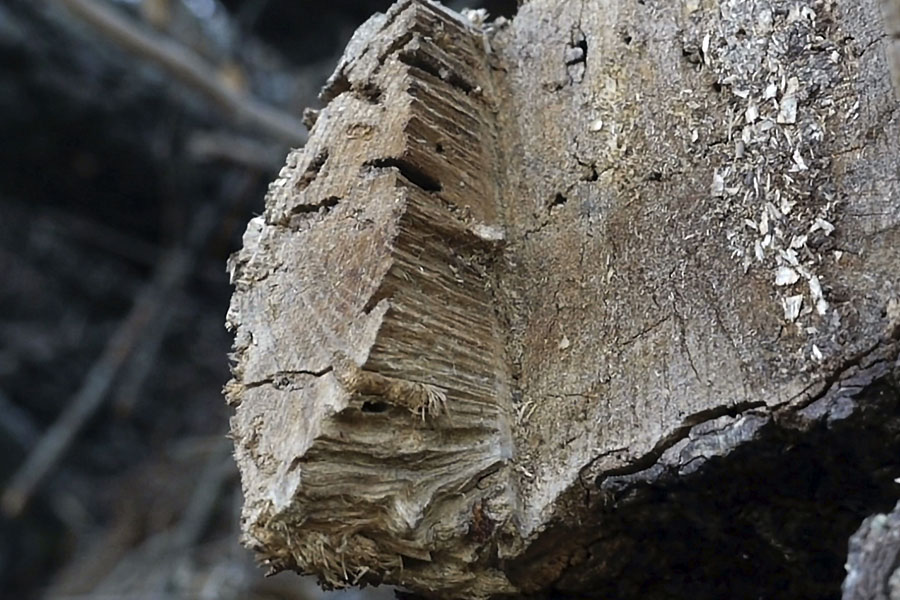Auditório do Solar da Música Nova, Loulé / Sun 14 NOV 16h00 FREE ADMISSION upon reservation Film (20') + Debate (60') / M12 30% Film / 20% Reflection / 40% Talk / 10% Saudade
Directed during the pandemic outbreak, with a feeling of urgency and minimal resources, Questo è il piano is a visual poem about the paradoxical appeal to the survival of species and relentless destruction. It was shot between March and April 2020 in a once protected and preserved part of coastal Alentejo, where the author came across a vast deforestation operation quickly approaching the dunes, completely indifferent to the pandemic situation.
In these months of lockdown we witnessed a radical deceleration of lifestyles around the world. The unsustainability of our economic models were, then more than ever, called into question, and ecology became one of the main themes, with countless authors correlating the outbreak of the pandemic with the relentless destruction of ecosystems.
This vast area was purchased by a large American group specialized in luxury tourism, and its rich pine and cork oak forest was being devastated and transformed to give way to a golf course and a resort. Completely ignoring the gravity of the moment, this huge operation threatened the region’s forest and water resources, neglecting the dangers of desertification, and the urgent need to protect the ecosystem and the balance our very existence depends upon.
Faced with this situation, Luciana Fina thought it was urgent to make a film to expose and report it, but also a film of disappointment. A film that confronts us with our powerlessness in the face of forces that, in the name of economic growth and progress, destroy the meaning of every thing we deem essential.
Questo è il piano premiered in November 2020 at DocLisboa and, following the author’s artistic practice, was made into a film installation for the exhibition Face à Vida Nua at MNAC – National Museum of Contemporary Art (Dec 2020 – May 2021).
Questo è il piano (2020) / Video HD, Sound, Color, 20′
Director, image and sound: Luciana Fina
Editing and sound mixing: Elsa Ferreira
Color: Andreia Bertini
Soundtrack: Giovanni Battista Pergolesi, “Questo è il piano“, cantata per contralto, archi e basso continuo, Voice: Gloria Banditelli, Conductor: Fabio Maestri. Complesso Barocco In Canto
Supports: MNAC, Kino Sound Studio
Acnowledgments: Cinemateca Portuguesa “Sala de Projeção”, Ernesto Rodriguês, Edmea Brigham, Cristina Fina, Emília Tavares, Luísa Homem.
DEBATE
In view of this devastation, and as we are currently discussing other interventions that could totally change the Portuguese landscape – such as lithium mining –, it seems relevant to bring together some experts to discuss the gap between tourism and sustainability. Discussing tourism vs environmentalism in a region such as the Algarve is important: we need to come up with alternatives so that future generations can still enjoy a natural environment that, in many aspects, now only exists in our grandparents’ memories.
The Algarve is still suffering from the inexistence, back in the 1970s and 90s, of development policies that took environmental issues in consideration. Now, in the 2000s, these policies are known and advocated. One can say that the Alentejo cannot repeat the Algarve’s mistakes. What can the Algarve teach us about the losses and gains of its morphological changes, always favoring tourism?
Guests: Associação Zero, Luciana Fina, Turismo do Algarve
Luciana Fina was born in Italy, where she studied Romance Literatures. She has been living and working in Lisbon since 1991. After a long collaboration with the Cinemateca Portuguesa as a programmer, in the late 1990s she made her debut in directing, thus joining an emergent generation of documentary directors in Portugal. Filmmaker and artist, her work often crosses over from the film theatre to the gallery space. She directed her first film, A Audiência, in 1998. She began exhibiting between 2002 and 2003, focusing on the themes of migration and portrait, with the installation CCM at the Gulbenkian Foundation, and the triptych CHANTportraits at the MNAC in Lisbon. Her extensive body of work – films, film installations and site-specific – has been shown at home and abroad in film festivals and exhibitions, and is present in the Modern Collection of the Calouste Gulbenkian Museum, and in the Nouveaux Medias of the Center Georges Pompidou. Among her works are the film In Medias Res (2014), which won the Best Film Award at the Arquiteturas Film Festival (PT) and an Special Mention at the Temps d’ Images Film on Art Award; the installation and film Terceiro Andar, Gulbenkian Museum (2016-2017), Doclisboa, and 34th Torino Film Festival. Her most recent installation, Andrómeda, was exhibited at Carpintarias de São Lázaro in the Festival Temps d’ Images, Lisbon (2021).

